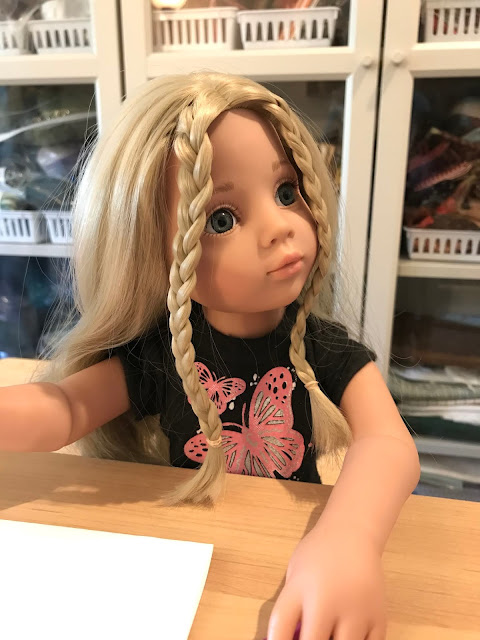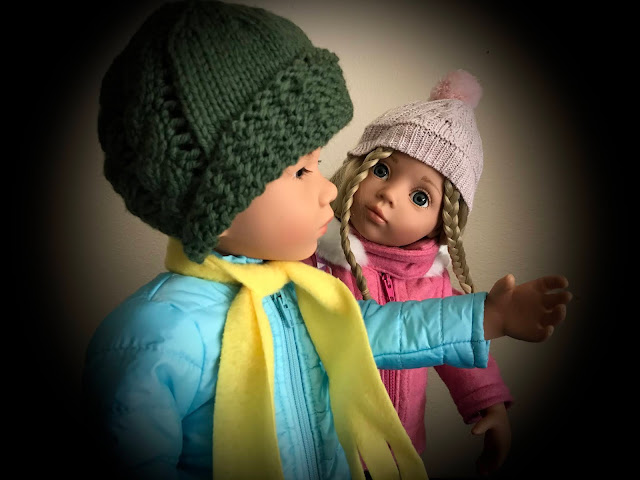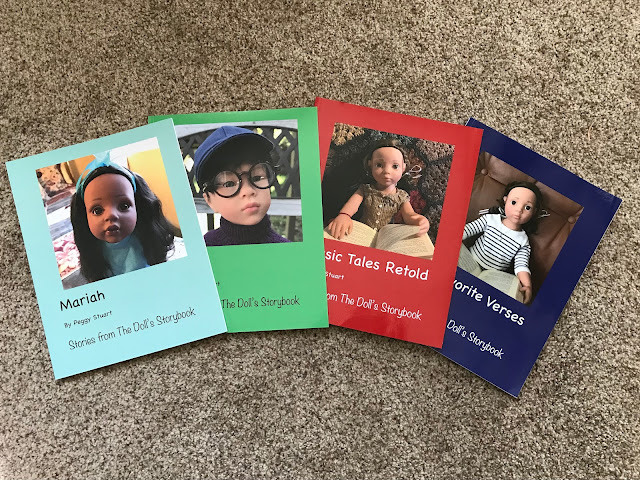"What are you doing?" Pippa asked. She had been watching Jolena. The older doll seemed to be working on some kind of worksheet. She would read, then look off into space and mutter to herself.
Jolena looked at Pippa. "Hi, Pippa," she said. "I'm trying to learn Spanish.
"What's Spanish?" Pippa asked.
"It's a language." Jolena replied, "like English, the language we speak here. It's a way dolls speak in some other countries, and some dolls here, too. It's hard to understand dolls who speak a different language from you unless you learn it, too."
"Why?" Pippa asked.
"Why, what?" Jolena asked in return.
"Why don't all dolls speak the same language?" Pippa asked.
"Well," Jolena said, "I'm not sure, but people tend to speak different languages in different places. I mean, everyone in one place seems to mostly use the same language. I noticed it when I went to Chile last summer. Dolls speak the languages their human families do."
"Chilly?" Pippa asked.
"Not Chilly, Chile," Jolena said, saying the name of the place like "Chee-leh." She remembered that Pippa wasn't part of the family yet when she went to Chile.
"This year," Jolena explained, "the ski team went to Argentina (ar-jen-TEEN-uh). That's close to Chile. I noticed that the dolls who live there speak Spanish, too."
"Say something in Spanish," Pippa begged. "I want to hear how it sounds."
"¡Buenos dias! ¿Cómo estás?" Jolena said. It sounded like "BWEH-nose DEE-ahs. KOH-mo ess-TAHS?"
"What did you say?" Pippa asked. "I mean, what does that mean?"
"It means 'Good morning! How are you?'" Jolena replied.
"What's the upside-down question mark for?" Pippa asked, moving her hands as if she were turning something upside-down.
Jolena didn't know how Pippa knew about that. Maybe Pippa could see what Jolena was imagining in her head, but she explained, "When you write in Spanish, the question marks and the exclamation marks come at the beginning and the end, instead of just at the end, the way we write in English, but you write it upside-down at the beginning of the sentence." Jolena demonstrated on her paper, so Pippa could see. She wrote, "¿Cómo?"
"Why?" Pippa asked as Jolena added a little mark over the first 'o'.
"I don't know why," Jolena answered. "Maybe it's just their custom, something they got used to doing."
"I know why," said Mariah, who had been reading nearby and happened to overhear the conversation.
Pippa and Jolena looked at Mariah expectantly. Mariah reads a lot and seems to know many things. There could be a connection.
"It's because of the word order," said Mariah. "I was reading about the different ways languages can vary from each other. It isn't just that they have different words for things. The words may be put together differently. In English we change the order of the words in a sentence if we're asking a question," she explained. "If I said, 'You are happy,' that would be a statement. I would be saying that you're happy, and I know it. If I changed the same words around and said, 'Are you happy?' you would know it was a question, because the verb––the action word––comes first."
"It isn't that way in Spanish," Mariah explained. "The word order is the same whether it's a question or a statement of fact. You can hear the difference when dolls are speaking, because their voices rise and fall differently for questions than for statements, but when you write, you can't hear that. The reader needs more help in reading Spanish."
"Why?" Pippa asked.
"Yes," Mariah exclaimed. "You just reminded me! I was going to forget to mention that we have words we use that also help us tell when something is a question. 'Why' is one of them. Spanish has those words, too. Not every question has one of these helping words, though."
"I meant," Pippa explained, "why are the languages different? Why don't we all speak the same language? It seems very inconvenient."
"Well," Mariah began, "languages were developed by human people, so they could work together. Different languages came from different parts of the world, the same way real human people began to look different from each other in different places. They changed over time. People made dolls to be like them, so dolls in different places mostly speak the language the people speak there."
Then Mariah thought of something she wanted to ask Jolena. "I was wondering," she began, "you have been to South America several times to ski when it's summer here. Why didn't you start to learn Spanish before you went the first time?"
"Other dolls make the arrangements," Jolena explained. "They help us when we get there. Unless we go into town, we don't need to know Spanish, and even then, the dolls who sell things can speak enough English to help if you want to buy something."
"This year," Jolena continued, "Jack, a doll on the ski team who can speak some Spanish, invited me to go with him to do some shopping in town."
"When we were in the stores," Jolena explained, "Jack made an effort use Spanish to talk to the dolls who worked there. He was able to talk with them about things that didn't have anything to do with the things they were selling. I couldn't understand what they were saying, but he told me later."
"It looked like a lot of fun," Jolena continued, "and the dolls in the stores seemed to enjoy it, so I decided I would try to learn a little Spanish, too, because we will probably go back to South America to ski again next summer. I noticed it makes the Spanish-speaking dolls smile when you try to talk to them in their language."
Pippa remembered that Emil was learning sign language. That looked like fun.
Charlotte and Mariah were learning languages their worship services use. That looked like fun, too.
"Hmmm," Pippa said. "Maybe I should learn another language, too." Then she thought about it for a moment. "Except," she said then, "I never seem to go anywhere."
"Pippa," Jolena said, "you never know where life will take you. Knowing another language besides English is always useful, and I'm learning that it's fun, even if you only use it at home. In fact, I'll teach you how to say something right now in Spanish. It should be the first thing you will want to learn."
"What is it?" Pippa wanted to know.
"¿Por qué?" Jolena said. She said it the way you would ask a question. It sounded like "por-KAY?"
"What does that mean," Pippa asked the older doll.
"I'll bet I know," Mariah cried. "It's your favorite word in English," she said. "Why!"
"That reminds me," Jolena added. "I'm fixing burritos (burr-EE-toes) de frijoles (free-HOLE-es) y (EE) arroz (AR-oes) for supper*."
"Little donkeys?" Mariah asked. (She didn't know much Spanish, but Mariah reads a lot, and she knew that a burro is a donkey, and that "-ito" or "-ita" on the end of the name of something meant it was little.)
Jolena laughed. "No," she said. "You take a tortilla––that's a kind of a circle of flat bread––and wrap it around some kind of filling. I'm using frijoles y queso. That's beans and cheese. We'll have them with arroz. That's rice."
"That's good," Pippa said. "I think little donkeys are cute. I wouldn't want to pretend to eat one, even if it was little."
No, Pippita, you would not want to pretend to eat a little donkey, but you will love pretending to eat a burrito. Just wait!
Jolena: Götz Happy Kidz Lena in Aspen
Mariah: Götz Happy Kidz Mariah, "Chosen" from My Doll Best Friend
"The Doll's Storybook" is not affiliated with Gotz Dolls USA Inc. or Götz Puppenmanufaktur International GmbH.
Watch for the next story each Friday afternoon at 1:00 PM Pacific Time.
Copyright © 2021, 2024 by Peggy Stuart




































A very beautiful story that reminds us how much easier life would be if everyone spoke the same language. Thanks for the recipe :-)
ReplyDeleteA gentle reminder of how curious young children can be. We love sharing your stories and we always find something we did not know.
ReplyDelete